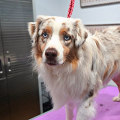As an expert in canine nutrition, I'm often asked what Australian Shepherds should eat. To ensure that your Australian Shepherd's nutritional needs are met, it's important to start with high-quality puppy or adult dog food. The MSD Veterinary Manual recommends feeding a puppy with croquettes that provide a minimum protein content of 22%, but a very active dog, such as the Australian Shepherd, should ideally be fed with croquettes with a minimum protein content of 26%. If you want to get off to a good start with your Australian dog, try this food for active breed dogs formulated for both adult dogs and puppies. Dogs need a collection of vitamins and minerals, some of which can come from healthy carbohydrates (although your dog doesn't need carbohydrates per se).
The Australian Shepherd is a medium-sized dog that will normally weigh between 40 and 65 pounds at maturity. The Association of Food Control Officials of the United States (AAFCO) recommends that dog foods contain a minimum of 22% protein for canine growth and reproduction (puppies and lactating females) and a minimum of 18% for adult dogs. The best dog food for Australian shepherds includes natural, healthy ingredients and starts with a premium source of animal protein. When it comes to feeding your Australian Shepherd, it's important to choose the right food. Look for foods that are specifically designed for active breeds like the Australian Shepherd.
These foods should contain high-quality proteins, healthy fats, complex carbohydrates, and essential vitamins and minerals. It's also important to look for foods that are free from artificial colors, flavors, and preservatives. Additionally, look for foods that are formulated to meet the nutritional needs of your specific breed. When selecting a food for your Australian Shepherd, it's important to consider their age and activity level. Puppies need more calories than adult dogs, so look for foods that are specifically formulated for puppies.
For adult dogs, look for foods that are designed for active breeds like the Australian Shepherd. Additionally, if your dog is overweight or underweight, you may want to consider switching to a food specifically designed for weight management. It's also important to consider your dog's individual needs when selecting a food. If your dog has any allergies or sensitivities, look for foods that are free from common allergens like wheat, corn, soy, and dairy. Additionally, if your dog has any medical conditions or special dietary needs, talk to your veterinarian about the best food options. Finally, it's important to remember that all dogs are different and have different nutritional needs.
Talk to your veterinarian about the best diet plan for your Australian Shepherd and make sure you're providing them with the nutrition they need to stay healthy and happy.







